- Home
- Pat Conroy
A Lowcountry Heart Page 6
A Lowcountry Heart Read online
Page 6
After we graduated, I began my life as a draft dodger and antiwar activist while my entire class walked off that stage and stepped directly into the Vietnam War. When I talk to Ivy Leaguers or war resisters of that era, I always tell them that Vietnam was not theoretical to me, but deeply and agonizingly painful. Eight of my Citadel classmates died in that war, and three of them—Bruce Welge, Fred Carter, and Dick O’Keefe—were boys that I loved and whose friendship I cherished. Two of the managers of my basketball team died there, and my teammate Al Krobuth was a prisoner of war in one of those soul-degrading camps where our captured airmen were tortured and debased on a daily basis. I played high school baseball with Jimmy Melvin, who died on a patrol in Vietnam, and attended the funerals of Marines whose children I taught at Beaufort High School. My father served two tours of duty in Vietnam, and I adopted and raised two daughters whose father, Captain J. W. Jones, was killed while flying close air support in defense of his Marines on the ground. I never was good at developing theories against the war, because too many slain and wounded faces rise up to argue with me about how I conducted myself during the war. I know all the excuses I used at the time, but I find myself wordless when I visit the Vietnam Veterans Memorial in Washington.
But Ted Bridis represented something about Vietnam that was agonizing to me. I had lost all contact with Ted until I was walking up to my tenth Citadel reunion with Saundra Hardin, and I heard a voice calling to me at the bottom of the stairs leading up to the Hibernian Hall. I’d not be invited back to a reunion for twenty-five years, because the appearance of The Lords of Discipline was on the horizon. But on that night, I heard a familiar voice call, “Hey, Pat, could you lend me a hand?”
I turned around and saw Ted Bridis for the first time since graduation. He was holding up his wheelchair in one strong arm, and asked if I’d carry it to the top steps of the Hibernian for him. In Vietnam, he had stepped on a land mine and lost both legs and an arm. The moment shocked me because I had not heard of the severity of his injuries.
“Sure, Ted. Be happy to,” I said, leaning down and giving him a hug.
Then I watched as Ted Bridis crawled and struggled up those stairs, refusing the help of any of his classmates who ran to his aid.
That night I learned that he’d come close to dying on the battlefield, but was saved by the swiftness and courage of a helicopter pilot, then airlifted to the surgeons who managed to save his life. At first he seemed a deformed shell of his former self, but as we spoke that night, I realized his wounds had enhanced his manhood and his own sense of himself.
He had married a woman who was equal to his valor, and her dedication in watching over him moved me at that last dance I attended as a Citadel graduate. From my classmates, I learned that Ted had lost his Citadel ring when his arm was blown off in Vietnam. My class had collected money and presented him with a new Citadel ring, but I did not get word and failed to contribute a single dime. Ted Bridis began his long term as symbol of the Class of ’67—the kind of man The Citadel could produce at its best.
Our friendship was never close, and that grieves me at this moment. But he and his wife attended every book signing I ever had in Miami, Florida. He would wait near the end of the line and I’d be furious at him for not just coming to the front to get his books signed before everyone else.
“I like waiting my turn, Pat,” Ted said. “I like to hear what everybody’s saying about your books. I tell them we were classmates at The Citadel.”
Ted only asked me for a single thing in his life, and I have reason to believe I didn’t come through on a promise I made him. He called me after Hurricane Andrew devastated his Miami home and told me that every one of my first-edition books I had signed to him was destroyed in the storm; he wanted to know if I could help replace them. I was living in San Francisco at the time and not in good emotional shape, but I started collecting my books from antiquarian bookstores and soon had every one of them except my first, The Boo. It was one of his prized possessions, but I could not find one for less than three thousand dollars and the Internet was not in existence.
Finally, The Boo himself found a copy in Charleston. I gathered the books together, put them in a box, addressed it, then went diving into one of the worst depressions of my life. Though I’ve gone over this sequence a hundred times since I heard of Ted Bridis’s death, I can’t remember mailing that box to Ted. I’m afraid I didn’t, and I find it disgraceful.
Ted lived an exemplary life in Miami. He participated in the Paralympic Games and won many championship medals. He became an indispensable counselor to those men and women who were grievously wounded in the Afghanistan and Iraq wars. He was beloved by his classmates at The Citadel. The Boo signed his last copy of The Boo “To Ted Bridis, the best lamb in my sorry flock.”
When I heard about his death, I remembered his voice on that Charleston night: “Hey, Pat, could you lend me a hand?”
I carried his wheelchair up the Hibernian steps, but I wish I’d done a whole lot more.
Great love…
The Teachers of My Life
MARCH 9, 2014
Hey, out there,
I’ve returned to Beaufort after my long tour for The Death of Santini, and the town has never seemed more welcoming or restful to me. Though I feel hollowed out and exhausted by the whirlwind nature of an American book tour, I’m smart enough to know that it’s still a grand way for any writer to connect to those readers he has picked up along the way. If any writer in this country has collected as fine and passionate a group of readers as I have, they’re fortunate and lucky beyond anyone’s imagination. It remains a shock to me that I’ve had a successful writing career. Not someone like me; Lord, there were too many forces working against me, too many dark currents pushing against me, but it somehow worked. Though I wish I’d written a lot more, been bolder with my talent, more forgiving of my weaknesses, I’ve managed to draw a magic audience into my circle. They come to my signings to tell me stories, their stories. The ones that have hurt them and made their nights long and their lives harder.
My past life rises up to greet me. Military brats that I went to school with forty years ago ask me if I remember my fourth-grade nun. Yes, that was Sister Virginia Mary, and Father James Howard was our priest, and I served my first mass after both of them made sure I’d memorized my Latin responses.
Citadel graduates show up everywhere, and, of course, I took off on this tour in October, forgetting my Citadel ring on the untidy desk where I left it. “Where’s your ring?” The question always comes. My explanation always sounds hollow, but they bring their wives, children, and grandchildren to meet me. The Marines and their families show up, and military brats by the score. Teachers come by the dozens from Minneapolis to Miami.
Ah, yes, the teachers of America. When I meet them I always say, “God’s work, but not God’s pay.” I enrolled myself in their ranks when I wrote my book The Water Is Wide, and they have never issued me my walking papers. I thought I was going to be a high school English teacher in Beaufort for my entire life—that, and write execrable poetry on the side. That was my original intention, but my life and my character intervened and I never taught again in my life. In the early years I thought I would teach writing in some college in the South, but the right opportunity never presented itself. Though I’ve never met a teacher who was not happy in retirement, I rarely meet one who thinks that their teaching life was not a grand way to spend a human life. The unhappy ones are the young ones, those who must teach in public schools when the whole nation seems at war with the very essence of teaching.
“Why do we hate our teachers in this country?” I ask them, and not one of them disagrees with me from Santa Fe to Charleston, from New Orleans to Philadelphia.
“I don’t know why. But I agree with you,” the teachers say in an almost unanimous voice.
The teachers of my life saved my life and sent me out prepared for whatever life I was meant to lead. Like everyone else, I had some bad ones and m
ediocre ones, but I never had one that I thought was holding me back because of idleness or thoughtlessness. They spent their lives with the likes of me and I felt safe during the time they spent with me. The best of them made me want to be just like them. I wanted young kids to look at me the way I looked at the teachers who loved me. Loving them was not difficult for a boy like me. They lit a path for me, and one that I followed with joy.
Teaching is an art form, pure and simple. I’ll trust a teacher over a bureaucrat every single time—a teacher over an administrator. Education by test scores seems like the worst thing that’s ever happened to American education, by far. I met ten high school English teachers on my trip whom I’d have loved to have teach me. To my surprise, my novel The Lords of Discipline is taught in more high school English classes than any of my others. I thought the language of the barracks and the nasty racism of the Corps would prevent that book from ever being taught in an American classroom. I met a whole cadre of teachers in Kansas City, Missouri, who had taught The Lords of Discipline for years. When I asked the head of the English department at a large public high school how his teachers navigate through parents and school boards offended by the book, he told me it had been a challenge, indeed. His teachers let their students make the case with the school board, and the passion of those students had carried the day each time the subject had come up. I fell in love with the English teachers of Kansas City, and that is a bond that’ll never be broken.
Yet the unhappiness of teachers was a constant theme, and they suffer from the lack of respect and honor due them for their choice to spend their lives teaching the children that are sent to them. The testing of American children all began with well-meaningness and high-mindedness. “No Child Left Behind” is a phrase of enormous beauty, yet it has caused more suffering among teachers than the pitiful wages we pay them. Whether it’s a Republican or Democratic administration doesn’t seem to make a scintilla of difference. The theories that are born in Washington, D.C., and in the Ivy League are ascendant throughout the country, and as far as I can tell and as well as I can listen, they’ve had a chilling effect on most of the classrooms in our land. A nation of unhappy teachers makes for a sadder and more endangered America.
Before my beloved English teacher Gene Norris died, he was given a lifetime achievement award by the South Carolina Council of Teachers of English. The year before, Gene had received the first “Guiding Spirit” Award, given by the Thomas Wolfe Society to honor Margaret Roberts, the extraordinary woman who had taught high school English to the great novelist. It was a good year for Gene, even though he was suffering greatly from the leukemia that would kill him. We drove to Greenville together for the ceremony on one of our last road trips. The chemo had made Gene grouchy and dyspeptic, and he said to me, “I don’t want you to go on and on about me. The way you usually do. You always exaggerate my influence on you. I’m so tired of you gilding the lily. I told them I don’t want this award and I certainly don’t deserve it.”
“Then why am I wasting my valuable time driving you to Greenville?” I asked.
“Because it’s good for teachers, carpetbagger. It’s good for all teachers—everywhere. They don’t get much,” he said, and he was grinning. “But I’m going to walk out of there if you do your usual bullshit about me.”
“I’ll say anything I want. I’m an American. I’ve got rights.”
Gene was magnificent when he received the award, and I was not the only one who saw him cry that day. Afterward, we were together when two bright and hilarious teachers stood up later in the program.
The first said, “No child left behind.”
“Every child left behind,” the second said.
“No school left behind,” the first said.
“Every school left behind,” the second said.
“No teacher left behind?” asked the first.
“Every damn teacher left behind.”
Gene and I joined in the standing ovation for these two singular women. On the way home, Gene was reflective and still deeply moved by the ceremony.
“I’ve had an amazing life, Pat. I wouldn’t change a thing. Except this: they used to trust teachers with the kids they sent us. It’s all different now and oh, so wrong.”
So the teachers came to my signings as they always do. Some were veterans of the inner-city schools and their voices filled up with urgency and despair. Some were in danger of being fired because of the low test scores of the students at their schools. When I asked a white woman in Philadelphia if she ever thought about transferring to a suburban school, she bristled at me. “Why would I do that? My kids need me. I’m in love with them. Who’d fight for them if it weren’t for teachers like me?”
Teaching remains a heroic act to me, and teachers live a necessary and all-important life. We are killing their spirit with unnecessary pressure and expectations that seem forced and destructive to me. Long ago I was one of them. I still regret I was forced to leave them. My entire body of work is because of men and women like them.
––––––
The word “blog” is the ugliest word in the English language to me. But I’ve written in journals in a haphazard fashion since I was a young writer. The journal I keep now is the material that makes up my own “blog”—though I’ve no idea what a blog is supposed to do or what it is supposed to consist of. Why it appeals to anyone is mysterious to me. But I use it as a way to sneak back into my own writing without being noticed. A new novel awaits my arrival, prepares for my careful inspection. Yet a novel is always a long dream that lives in me for years before I know where to go to hunt it out. When I found myself in new cities or strange airports on this trip, I could feel it stirring around on the outer rings of consciousness. I could feel it begin to layer itself. Though it pointed to no real beginnings or endings, I believe I’ve got two long novels and three short ones still in me. But my health has to cooperate and I need to pay more attention to my health. It is not long life I wish for—it is to complete what I have to say about the world I found around me from boyhood to old age. Because I’ve gotten older, I worry that there will be a steep decline in my talent, but I promise not to let the same thing happen to my passion for writing.
My career still strikes me as miraculous. That a boy raised on Marine bases in the South, taught by Roman Catholic nuns in backwater Southern towns that loathed Catholics, and completed his education with an immersion into The Citadel—the whole story sounds fabricated, impossible even to me. Maybe especially to me.
Throughout my career I’ve lived in constant fear that I wouldn’t be good enough, that I’d have nothing to say, that I’d be laughed at, humiliated—and I’m old enough to know that fear will follow me to the very last word I’ll ever write.
As for now, I feel the first itch of the novel I’m supposed to write—the grain of sand that irritates the soft tissues of the oyster. The beginning of the world as I don’t quite know it. But I trust I’ll begin to know it soon.
Great love…
Barbara Warley Was Loved by Everyone
MARCH 26, 2014
I’ve come to that point in my life when my memories seem as important as the life I’m now leading. On February 26, I drove from Beaufort, South Carolina, to Williamsburg, Virginia, to attend the memorial service of Barbara Nelson Warley—she of the grand spirit and radiant beauty. Her husband, John, who roomed with me on the baseball team, was the best friend I made at The Citadel, and we were inseparable during our senior year. Neither of us dated much that year—no, let me be blunter than that; we dated hardly at all, except on big weekends when cadets in Romeo and Tango companies had sisters who required escorts to the Corps Day Hop. But John and I would drive around Charleston on weekend nights, talking about girls and where we might go to pick some of them up. We never found that mythical place.
In Rome, at dinner with the novelist Gore Vidal, I once talked about my friendship with John Warley. Gore was fascinated by military colleges and had liked my book The L
ords of Discipline. His father had attended West Point and had been a legendary football player there.
“You do realize, Pat, that Mr. Warley and you were gay.”
“I can’t wait to tell John,” I said.
I missed John and Barbara’s wedding at the National Cathedral in Washington. I believe I was embroiled in a fight with the school board to get my job back on Daufuskie Island, and I did not meet Barbara until after The Water Is Wide was published. They were living in the Claremont Apartments, within rock-throwing distance from the Culpeper Street house I lived in when Dad was stationed at the Pentagon.
Barbara Warley was a pure knockout, the stuff bad novels are made of. I’d never seen such a pretty girl and I found myself as intimidated as I was dazzled. But she bounced up to me and kissed me on the lips and said, “John’s told me all about you and I bet we’re friends forever.”
So it was and so it would always be. When John went to work the next day, Barbara and I began telling each other the stories of our lives. Instinctively, we identified ourselves as members of that unhappy tribe who come from troubled and deeply flawed families. Like me, she endured one of those violent fathers who made their kid’s life a march of shame and terror. I had begun to write the first chapters of The Great Santini and told her of my own difficulty in describing a father I had loathed since I was an infant. When I told her I’d always worried that John’s parents did not seem to like me very much, she surprised me by saying that I was John’s parents’ least liked friend among all of John’s acquaintances. With a great laugh, she then admitted that John’s mother and father didn’t seem to like her much better. Barbara thought the Warleys thought John would marry a much higher-class girl, “and they certainly want John hanging around with a much higher-class guy than you.”

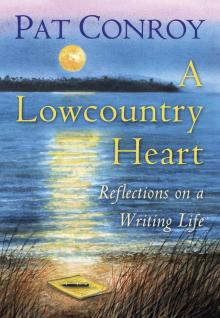 A Lowcountry Heart: Reflections on a Writing Life
A Lowcountry Heart: Reflections on a Writing Life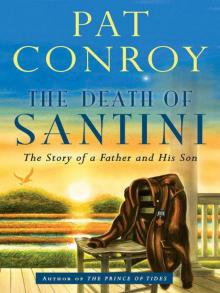 The Death of Santini: The Story of a Father and His Son
The Death of Santini: The Story of a Father and His Son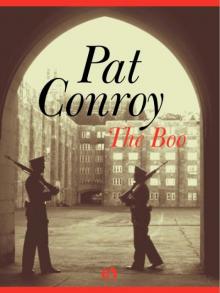 The Boo
The Boo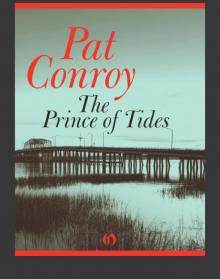 The Prince of Tides
The Prince of Tides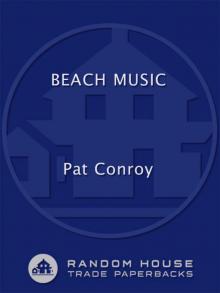 Beach Music
Beach Music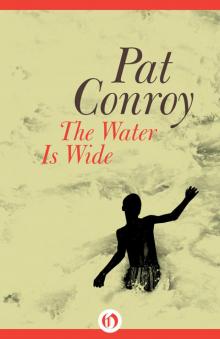 The Water Is Wide
The Water Is Wide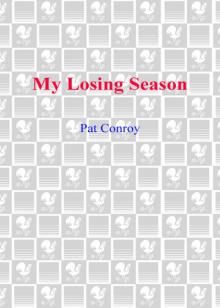 My Losing Season
My Losing Season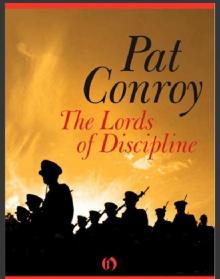 The Lords of Discipline
The Lords of Discipline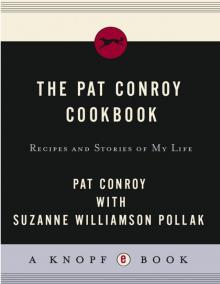 Pat Conroy Cookbook
Pat Conroy Cookbook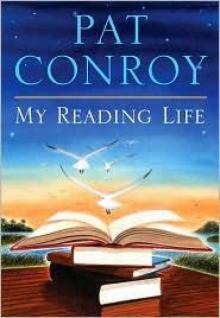 My Reading Life
My Reading Life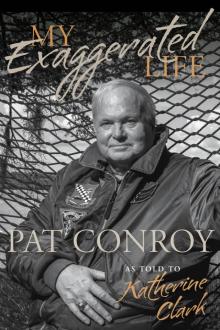 My Exaggerated Life
My Exaggerated Life The Pat Conroy Cookbook
The Pat Conroy Cookbook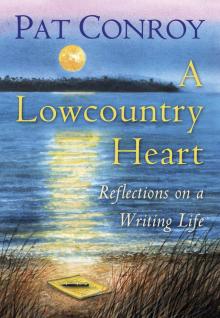 A Lowcountry Heart
A Lowcountry Heart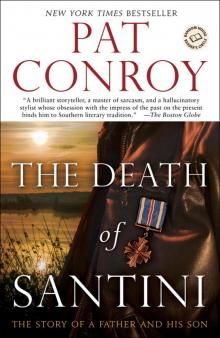 The Death of Santini
The Death of Santini